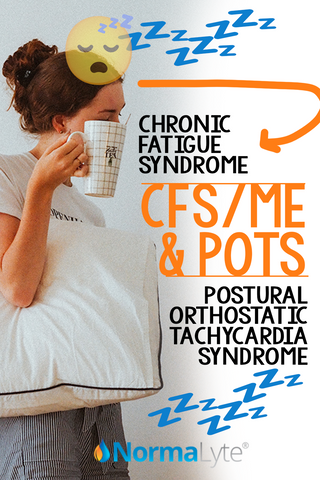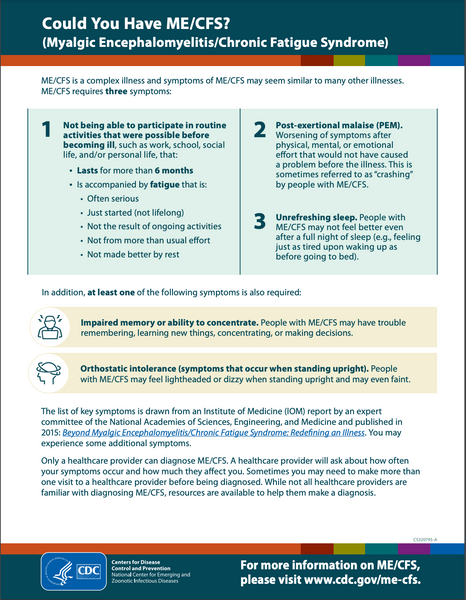Chronic Fatigue Syndrome (ME/CFS) and POTS


Life with any chronic illness can be challenging. But what if you have more than one chronic illness? Unfortunately, for some, that's a common occurrence. They are called comorbidities, conditions that often go hand in hand.
Keep in mind that having one condition doesn't guarantee that you have another. Comorbidities are simply common connections between two medical conditions. Sometimes physician's don't know why two different conditions seem to go together.
What is POTS
Postural orthostatic tachycardia syndrome, or POTS, is a condition that is defined by a myriad of different symptoms. POTS is a disorder of the autonomic nervous system, which controls involuntary body functions such as heart rate, blood pressure, and digestion. Symptoms include:
- dizziness
- rapid heart rate
- fatigue
- shortness of breath
- nausea
POTS is not a condition that can easily be seen on the outside. Often people with POTS look just like anyone else, making it considered an "invisible illness".
What is ME/CFS
Chronic Fatigue Syndrome, or CFS, and myalgic encephalomyelitis, or ME, is a condition with no known cause. At the time of writing this, physicians have no idea for sure what causes it, and according to the CDC, it's suspected that almost 90% of cases are undiagnosed.
Postural orthostatic tachycardia syndrome (POTS) and Chronic Fatigue Syndrome (ME/CFS) are two complex and debilitating medical conditions that often occur together. ME/CFS is a complex multisystem disorder characterized by
- severe fatigue
- cognitive impairment
- post-exertional malaise
- muscle and joint pain or aches
- headaches
It's important to know that ME/CFS, like POTS, is a condition that is considered an "invisible illness". People with this condition may look completely normal on the outside.
How are POTS and ME/CFS connected?
The exact connection between POTS and ME/CFS is not fully understood, but there are several possible explanations.
One theory has to do with the loss of blood flow during a tilt table test. Both conditions have shown that blood flow to the brain is diminished during this testing. A study in 2020 by Van Campen/Rowe/Visser, is called groundbreaking by some by suggesting that the lack of blood flow to the brain could be to blame for some of the symptoms.
Another theory is that POTS and ME/CFS share a common underlying immunological or inflammatory pathway. It is also possible that POTS and ME/CFS are distinct conditions that can coexist in the same person.
What are the symptoms of ME/CFS?
The symptoms of ME/CFS can vary from person to person, but some common symptoms include:
- Severe fatigue that lasts for at least 6 months
- Worsening of symptoms after physical or mental activity (post-exertional malaise)
- Unrefreshing sleep
- Difficulty concentrating and remembering
- Muscle pain
- Headaches
- Tender lymph nodes
- Sore throat
What percentage of POTS patients have ME/CFS?
Unfortunately, this number is up for debate. There have been several studies that mention the likelihood of having POTS when you already have a ME/CFS diagnosis, but none of them seem to agree. The numbers range from anywhere to 70% to as little as just under 6%.
Prevalence of POTS in ME/CFS population samples
| Study: |
Number of
ME/CFS patients: |
Percentage with POTS" |
| Stewart et al. 1999 | 25 | 70% |
| Schondorf et al. 1999 | 75 | 40% |
| Hoad et al. 2008 | 59 | 27% |
| Van Campen et al. 2018 | 627 | 25% |
| Dowsett & Ramsay, 1990 | 420 | 21% |
| Lewis et al. 2013 | 179 | 13% |
| Reynolds et al. 2014 | 306 | 11% |
| Roerink et al. 2017 | 419 | 5.7% |
How are POTS and ME/CFS diagnosed?
There is no single test to diagnose ME/CFS. Diagnosis is typically based on a thorough medical history and physical examination, as well as a number of specialized tests.
For POTS, diagnosis is done usually through a tilt table test, or by watching heart rate on a monitor. Some family doctors will diagnose, but sometimes your family doctor will send you to a specialists such as a cardiologist or neurologist to rule out any other possible conditions.
Could I have ME/CFS?
The CDC has a great document that goes over how to identify if you may have ME/CFS:
How are POTS and ME/CFS treated?
There is no cure for POTS or ME/CFS, but there are a number of treatments that can help to manage the symptoms. Treatment for POTS may include medications, lifestyle changes, and physical therapy. Treatment for ME/CFS typically involves a combination of rest, medications, increased salt intake, and therapy.
If you have POTS, increasing salt is often times the number one doctor recommended treatment. NormaLyte is a great way to hydrate more effectively than with water alone, and it's been clinically proven to help manage symptoms of POTS.
If you think you may have POTS or ME/CFS, it is important to see a doctor for diagnosis and treatment. If you are experiencing symptoms of either, please talk to your doctor about the best course of treatment for you.










Matt – It’s frustrating to feel like there aren’t clear answers, but you’re definitely not alone—so many in the POTS community experience the same ups and downs, especially when it comes to chronic fatigue and POTS. The connection between POTS and ME/CFS is still being researched, but recognizing that symptoms fluctuate day to day is an important part of managing them.
Many POTS patients find that consistent hydration and electrolyte balance can help stabilize symptoms, even when other treatments fall short. Since you’ve tried IV infusions, you might find that a medical-grade electrolyte powder for POTS patients, like NormaLyte, is a more convenient way to support rehydration for POTS daily. It follows the World Health Organization’s Oral Rehydration Solution (ORS) formula, which is designed for maximum absorption.
We completely agree—more research is so needed! Hoping you find something that helps bring relief soon. Have you noticed anything, even small, that has made a difference for you?
I’ve been diagnosed with pots and I have to say a lot of this article makes sense. The chronic fatigue and inability to any for of exercise, I think it’s connected. It’s also a spectrum of symptoms. Some days I can do more than others. No Dr has been able to provide any insight or guidance on what to do to make the symptoms minimal. I’ve tried many different medications and other forms of treatment such as IV liquid infusions. Nothing has truly helped. I hope more research is done so the people suffering from this like myself, don’t have to anymore.
Good article. I have been thinking I have POTS due to heart rate rise but I also cannot do anything during the day without a lot of effort and wake up feeling sick with muscle soreness and dizziness. I think I must have ME/CFS too. I’ve been to every Dr there is and they will not give a definitive answer and just say this is something I may have to live with. 😢
Leave a comment